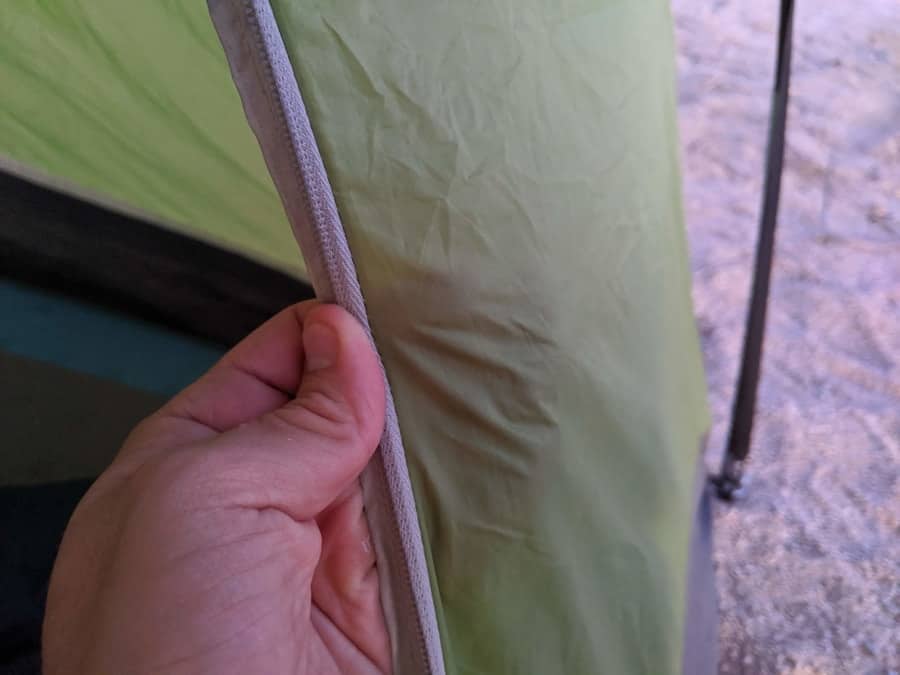
I was laying down in my tent one night after a great day of hiking and cooking food on the campfire and I turned over and saw the tag on the inside of my tent. Naturally, in order to avoid going to sleep, I read the tag and on it what the fabric was. It got me thinking about what tents are made from and if what different kinds of fabrics make up tents, and of course what the best fabric is for a tent.
What are tents made of? Most tents are made from either Nylon or Polyester materials. There are however a few other common fabrics that tents are made of.
Each material has its advantages and disadvantages. Mostly what we want today is a material that is strong, yet lightweight. Most of the materials are treated and coated in order to weatherproof the tents. Knowing the benefits and drawbacks of tent materials can help you in selecting a good tent for your camping needs.
By the way, If you are in the market for a new tent, then you should click here to see the one I recommend on Amazon.
What are tents made of?
Tents can be made from several different types of fibers. Historically, tents were usually made with cotton known as canvas. The tents were sturdy but very heavy. Today’s tents are mostly made from lighter man-made fibers. Notably polyester or nylon. These fabrics are also usually treated with something to make them waterproof. Usually, they either have silicone impregnation or an added polyurethane coating.
These modern-day treatments may make tents more waterproof, but they do not completely protect them from the sun’s ultraviolet rays. UV rays are highly damaging to the thin man-made fabrics. Each of the fabrics has their own advantages and disadvantages, but most likely you will end up with a tent made of Polyester or Nylon.
Nylon Tents
A nylon fabric one of the best fit for a small tent as the fabric is extremely lightweight. Nylon fibers do not absorb water, which makes them ideal for tents. You can find nylon tents at very low prices on cheap tents and also at very high prices on higher quality expedition tents. Nylon is particularly susceptible to the sun’s rays so you need to be more careful with prolonged exposure if you have a nylon tent.
Nylon is usually coated with acrylic, polyurethane (PU) or silicone. A silicone coating is said to offer the best overall protection on a nylon tent. You really can’t go wrong with a Nylon tent. There are many people that enjoy camping with their lightweight waterproof nylon tents.
Polyester Tents
This fabric is on par with popularity with nylon. A lot of family-style tents are made from nylon. It is a bit heavier and generally tougher than nylon. Many manufacturers like to coat this fabric with different coatings and then patent the new material they make. For example, Coleman has a fabric they call “weather tec” for which the tent’s primary fabric is polyester.
This material does not get heavy or shrink when it gets wet. Polyester is also known to less affected by sunlight than other man-made materials. A polyester based tent is probably going to be what your first tent is made from. The fabric is cheaper, yet still durable and so many mainstream tents are made from polyester.
Cotton/Canvas Tents
Cotton tents were at one time the most popular fabric for tents but because of their size and weight, they have been quickly replaced with lighter and cheaper man-made fabrics. The cotton fabric breathes naturally so it is known to keep cooler on warm days and stay warm on cold days. Especially when compared to modern camping tents, cotton tents are now looked at as a more luxury style tent.
The insulating factor alone makes it more luxurious and demands at least a look. When you think of cotton tents, imagine a white “yurt” style tent. You will pay extra for this luxurious style tent, especially since they are not popular anymore and most manufacturers stick with polyester and nylon-based tents. Another unique factor with cotton-based tents is that you actually need to break it in before you go camping in order to complete its waterproofing.
If you take a brand new cotton tent out camping and it rains, then you might get a little wet inside. It’s actually normal for water to find its way through a new cotton tent. The cotton fibers need contact with water in order to expand against each other. After leaving it out in the rain or wetting it down with a garden hose you need to let it dry and you should be good to go. Some report that it takes more than one wet to dry cycle for the cotton-based tent to become waterproof.
Other Materials for Tents
There are some other types of tents but they are usually hybrids of the main three fabrics above. For example, you can have polycotton tents which are a mixture of cotton and polyester. This combination gives you a lighter fabric with the same strength as a regular cotton tent. It will usually be coated with something in order to waterproof it.
Another combination is Poly Vinyl Chloride (PVC) coated canvas tents. This is simply just a canvas tent with a generous amount of coating (usually on the roof) to help with weatherproofing. The coatings can make ventilation a problem and so condensation could build up in this kind of tent. They are usually large and bulky tents.
What kind of tent fabric is best for me?
What is best for you is going to depend on your camping needs. If you are a recreational camper and will primarily camping in the summer then you will probably be fine with getting a fair priced polyester family-style tent. The size also depends on who will be camping with you. Always get a tent bigger than what it is rated for if you are car camping since size and weight usually isn’t an issue for this type of camping.
If you camp and usually sleep alone in your tent or just with one person and you may want to get more into camping like backpacking or at least walk-in campsites then perhaps you should consider a nylon tent. They are lighter and more suitable for minimalist camping and camping where you need lighter weight such as backpacking or hike in campsites. Nylon tents are good for regular camping too so this makes them versatile.
Cotton tents are much more rare to find today so it will probably take some special ordering to find one. They aren’t lightweight or portable by any means so if that is not a problem then you should consider one. You will probably find the cost factor to be much higher than polyester or nylon tents. Often, cotton tents are considered “glamping” tents. If you have the resources and want a very comfortable tent then check out cotton tents.
Most of the time, especially if you are reading this on Small Car Camp then you are probably better off going with a simple basic polyester tent. The tent I have frequently used and recommend is polyester based and its a good price. The material is strong and yet lightweight.
A big advantage is its ability to last better in the sun. You should be taking down your tent every day to keep it out of the sun to make it last longer, but let’s be honest. We get lazy and just leave our tents up the whole time. I’ve been guilty of this and you probably are too. Get a strong lightweight tent made of polyester and 90% of the time it will fit your basic camping needs.
Related Questions:
Are most tents waterproof?
Most tents on the market are water-resistant. They are usually treated with something to increase waterproofing. It is always best to test out a new tent’s waterproofing before you go camping. You can also easily waterproof your own tent for a low cost as I have discussed in full detail in this post.
What is a double-wall tent?
A double-wall tent is a tent that is made with two different parts: The body, and the rainfly. If you have the option to put a rainfly on top of your tent then you have a double-wall tent. Usually, the tent body is breathable but not waterproof. The rainfly is waterproof but not breathable. Combine the two and you now have a waterproof and breathable tent.
My Favorite Camping Gear
- Air Mattress: click here
 to check out my favorite on Amazon.
to check out my favorite on Amazon. - Tent: click here
 to see my favorite tent available on Amazon.
to see my favorite tent available on Amazon. - Sleeping Pad: click here
 to check out the one I love on Amazon.
to check out the one I love on Amazon. - Sleeping Bag: click here
 to see the one I recommend on Amazon.
to see the one I recommend on Amazon. - Camping Stove: click here
 to see the best camping stove on Amazon.
to see the best camping stove on Amazon.

